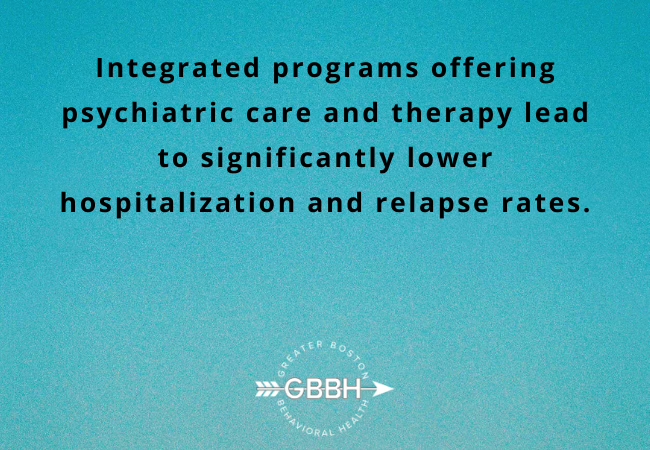When you or a loved one is seeking support for a mental health condition, choosing the right treatment program can feel overwhelming. With so many options available, it’s important to know what separates an average mental health program from one that truly makes a difference.
At Greater Boston Behavioral Health, we understand that effective care goes beyond just offering therapy sessions—it means delivering structured, evidence-based, and compassionate treatment that promotes long-term recovery. Whether you’re exploring outpatient services, residential care, or a Partial Hospitalization Program in Boston, knowing what to look for can help you make a confident and informed decision.
Here’s a breakdown of the key features of a high-quality mental health program—and how to recognize when a provider is the right fit for your needs.
1. A Full Continuum of Care
One hallmark of a strong mental health provider is their ability to offer a range of program levels, allowing clients to receive the right amount of support at each stage of their recovery.
At Greater Boston Behavioral Health, we offer:
- Outpatient Therapy: Weekly therapy for mild to moderate symptoms
- Intensive Outpatient Program in Boston (IOP): 3–5 days/week, 2–4 hours/day
- Partial Hospitalization Program in Boston (PHP): 5 days/week, 4–6 hours/day
- Residential Treatment Program in Boston: 24/7 care in a structured environment
- Inpatient Treatment Program in Boston: Acute stabilization in a hospital setting
This full continuum allows for seamless transitions between levels of care, depending on your progress, stability, and needs.
2. Evidence-Based Therapies
A good mental health program should prioritize proven, research-backed treatment approaches, not one-size-fits-all talk therapy. Look for providers that specialize in modalities such as:
- Cognitive Behavioral Therapy Boston (CBT): Helps identify and change negative thought patterns and behaviors.
- Dialectical Behavior Therapy in Boston (DBT): Teaches emotional regulation, distress tolerance, and interpersonal effectiveness.
- Trauma-Informed Therapy: Addresses the effects of trauma in a safe, sensitive environment.
- Anger Management Therapy in Boston: Focuses on healthy emotional expression and conflict resolution.
At GB Behavioral Health, our clinical team uses integrated, personalized approaches that combine these therapies based on your goals and diagnosis.
3. Individualized Treatment Plans
No two people have the same life experiences, symptoms, or goals—and a quality program reflects that. The best Mental Health Programs in Boston create customized treatment plans that consider:
- Clinical diagnosis
- Trauma history
- Family dynamics
- Medication needs
- Cultural and personal values
- Professional and educational responsibilities
From individual therapy to group support, family sessions, and psychiatric care in Boston, your treatment plan should feel tailored—not templated.
4. Access to Licensed, Multidisciplinary Clinicians
Effective programs bring together a team of qualified professionals with diverse specialties. Look for a program where you’ll have access to:
- Licensed therapists and counselors (LMHCs, LCSWs, psychologists)
- Psychiatrists or psychiatric nurse practitioners for medication support
- Group facilitators and behavioral health technicians
- Case managers and discharge planners
At Greater Boston Behavioral Health, our Mental Health Treatment Center Boston is staffed with a team that collaborates daily to track your progress, make real-time adjustments, and ensure your care is cohesive and coordinated.
5. Integrated Psychiatric and Medication Management
For many clients, mental health recovery includes psychiatric evaluation and medication support. A good program should not only offer access to psychiatrists but also:
- Monitor side effects and efficacy
- Adjust medication as needed
- Educate clients on medication use
- Support non-medication treatment preferences when appropriate
We provide in-house psychiatric care in Boston, ensuring that medication is managed safely and effectively as part of your overall plan.
6. Group Therapy and Peer Support
Healing happens in community. Group therapy is a key part of nearly every mental health program—and for good reason. It allows clients to:
- Practice communication and interpersonal skills
- Share experiences in a safe space
- Build a support network
- Feel less isolated and more empowered
Whether you’re in IOP, PHP, or residential care, group sessions at GB Behavioral Health are facilitated by experienced clinicians and rooted in trauma-sensitive practices.
7. Family Involvement and Education
Family dynamics often play a major role in mental health and recovery. A high-quality program should offer:
- Family therapy sessions
- Psychoeducation about mental health conditions and treatments
- Coaching on communication and boundaries
- Support for family members’ emotional well-being
We work with families to build stronger systems of support around our clients—because healing is a shared journey.
8. Focus on Real-Life Skills and Aftercare Planning
A great mental health program should prepare you not only to feel better—but to live better. This includes:
- Daily living skills for clients in PHP and residential care
- Coping strategies for managing triggers, stress, and emotions
- Relapse prevention planning for depression, anxiety, trauma, or substance use
- Connection to ongoing support after discharge (IOP, outpatient, or alumni services)
Your recovery shouldn’t end when your program does. That’s why we offer ongoing support through aftercare, referrals, and structured transition planning.
Why Choose Greater Boston Behavioral Health?
At Greater Boston Behavioral Health, we don’t believe in cookie-cutter care. We believe in meeting people where they are—with compassion, clinical excellence, and an unwavering commitment to recovery.
Here’s why individuals and families across the region trust us:
- Full spectrum of care—from outpatient to inpatient services
- Evidence-based therapies like CBT, DBT, and trauma-focused care
- Licensed multidisciplinary staff with years of experience
- Personalized treatment plans and 24/7 psychiatric support
- Safe, inclusive spaces designed for healing, not judgment
Whether you’re seeking Anger Management Therapy in Boston, a Partial Hospitalization Program, or simply someone to talk to, our team is here for you.
Conclusion
Choosing a mental health program is more than just scheduling a therapy session. It’s about finding a place that sees you, hears you, and walks with you through every step of your healing.
At Greater Boston Behavioral Health, we offer more than treatment—we offer a path toward clarity, connection, and lasting change. Whether you need intensive daily support or flexible outpatient care, we’ll help you find the program that fits your life and fuels your growth. Call us at (888) 278-0716 to take the first step toward a healthier, more supported future.
FAQ on Mental Health Program
What are the signs of a quality mental health program?
A strong program offers evidence-based therapies, licensed professionals, individualized care plans, psychiatric services, and a full continuum of treatment options.
Why is a full continuum of care important?
It ensures that clients receive the right level of support—whether they’re stepping up into PHP or IOP, or stepping down from inpatient or residential care.
Should a mental health program include psychiatric care?
Yes. Access to psychiatric evaluation and medication management is essential for many individuals managing anxiety, depression, bipolar disorder, and more.
What role does therapy type play in quality care?
The use of proven treatments like CBT, DBT, and trauma-focused therapy helps address underlying issues and build long-term skills for emotional wellness.
Does Greater Boston Behavioral Health offer personalized treatment?
Absolutely. Every client receives an individualized plan tailored to their diagnosis, history, and recovery goals—delivered with compassion and clinical excellence.


